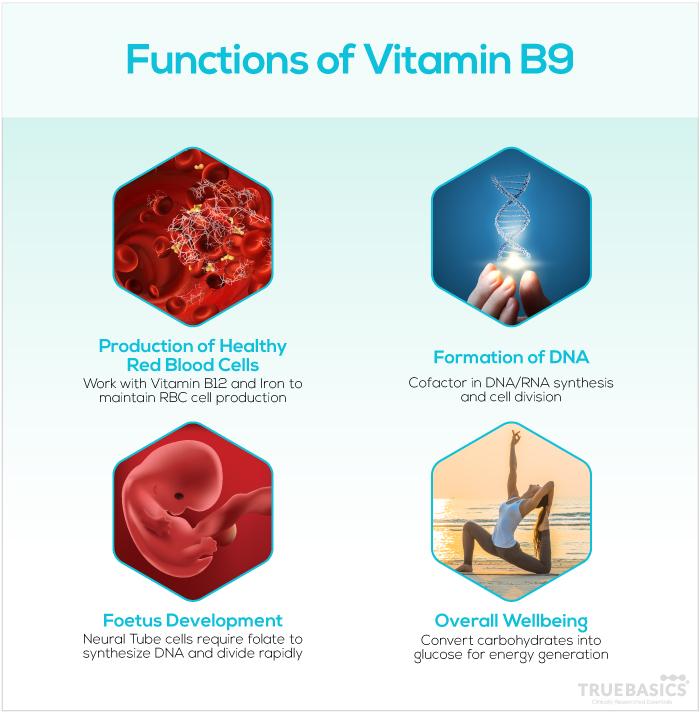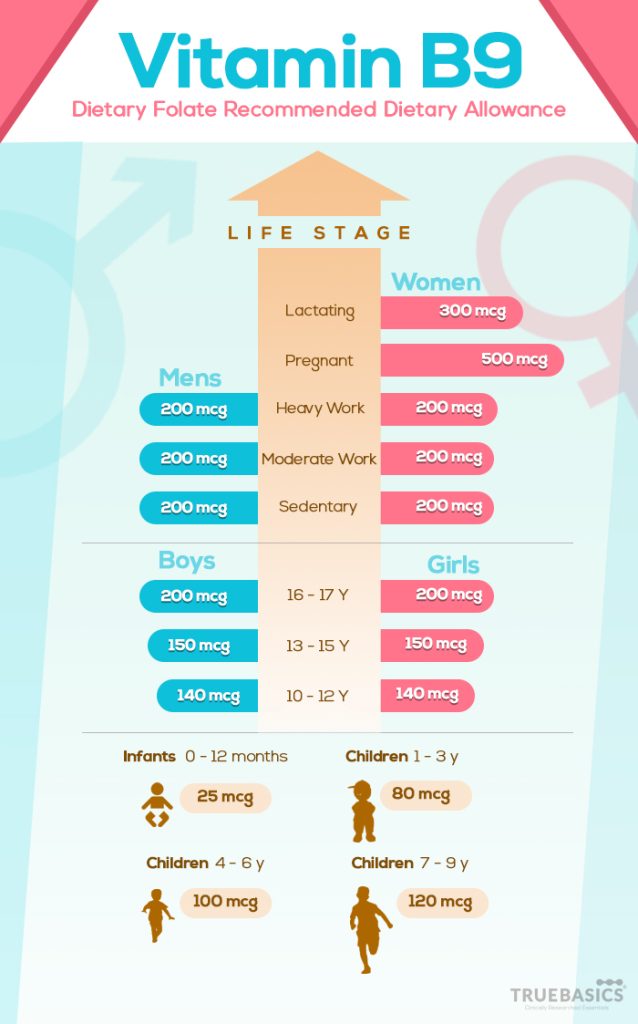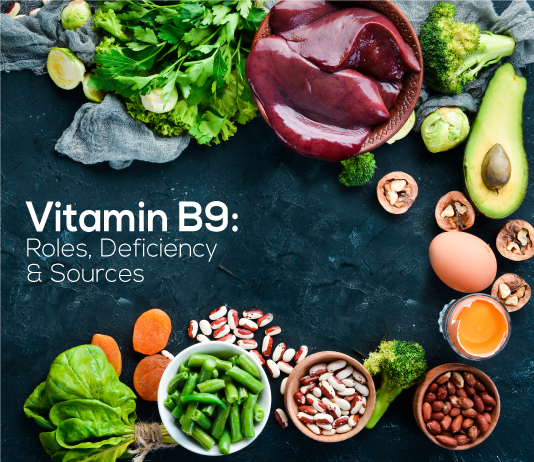Vitamin B9 is a relatively unknown nutrient and yet it plays important roles in our life. It is water-soluble and is found in two forms:
- Folate – the naturally occurring form of Vitamin B9 that is found in green leafy vegetables and plant sources.
- Folic acid – the stable, synthetic form of Vitamin B9 that is found in pharmaceuticals, supplements, and fortified foods.
We cannot synthesize Vitamin B9 on their own and thus, must acquire it through external sources. Whether it is consumed as folate or folic acid, Vitamin B9 remains in its chemically ‘inactive’ form, Tetrahydrofolate or THF. After ingestion, it is converted into its ‘active’ form i.e. 5-MTHF which is then utilized by the body. Our body usually keeps half of the body folate in the liver while the rest is kept in blood and body tissues. However, excess Vitamin B9 is not stored in fat tissues of the body and excreted out of the system.
Functions of Vitamin B9
Vitamin B9 plays a critical role in the production of new red blood cells and the development of an infant’s neural tube into the brain and spinal cord.
Vitamin B9 performs the following functions in our body:
1. Production of healthy red blood cells
Our bodies produce new red blood cells regularly in a process called erythropoiesis. In the infant stage of the red blood cells, folate is required for cell differentiation, where the stem cell changes into a more specialized cell. It works closely with Vitamin B12 and Iron to maintain the production of red blood cells [1] which are responsible for oxygen transport to the cells. A thorough analysis of the blood can provide reliable information about the folate concentration in the body [2].
2. Synthesis of DNA
Folate coenzymes are key in the synthesis of DNA and RNA from their precursors. The active form of Vitamin B9 assists cells in important methylation reactions and helps to maintain healthy cellular function. Vitamin B9 is a cofactor in cell division and assists in the formation and maintenance of healthy cells. Therefore, Vitamin B9 is especially important for pregnant women and children.
3. Foetus development
The neural tube is one of the first few structures that develop in the human embryo. Neural tubes are flat structure but then roll to form the brain and spinal cord in the first trimester. In embryos, the rapidly dividing cells of the developing neural tube require the synthesis of large amounts of DNA/RNA. This synthesis of DNA/RNA requires folate coenzyme. Since this process occurs soon after conception, it is often advised to consume folate if women are trying to get pregnant. A deficiency of folate in the early stage pregnancy is often related to Neural Tube Defect.
4. Overall well-being
In several complex metabolic reactions like the methionine cycle, folate plays a vital role and contributes to the overall well-being by ensuring proper liver functioning.
The amino acid serine that is required to produce serotonin, depend on Vitamin B9 for cellular reactions and transportation, indicating a deeper relation between Vitamin B9 and mental health [3].
Folic acid also helps in converting carbohydrates into glucose for energy generation.
It also works with Vitamin B6 and Vitamin 12 to control homocysteine levels in the body. A higher amount of homocysteine is often connected with heart diseases.

Vitamin B9 Deficiency
A deficiency of folic acid can halt the production of new red blood cells leading to folic acid deficiency anaemia and increase the risk of birth defects especially the brain and spinal defects.
The following factors can create a deficiency of Vitamin B9 in the body
- Dietary intake of folate is low
- The body is unable to absorb the Vitamin from food
- The body expels more folate than usual
- Alcohol, heavy medication and medical conditions such as sickle cells
- Higher requirement during pregnancy
Vitamin B9 deficiency often occurs in conjunction with Vitamin B12 and Iron. The risk group, apart from women of childbearing age, expecting mothers and people having malabsorptive disorders also includes alcoholics [4]. Alcohol interferes with the metabolism of Vitamin B9 – it reduces the intestinal absorption of the Vitamin, upsets its supply to tissues and disrupts folate’s processing, storage and release patterns in the liver [5].
Vitamin B9 deficiency can cause the following problems:
1. Megaloblastic Anaemia
A folate deficiency negatively impacts cell division and DNA synthesis and repair, thereby hindering the production of red blood cells. The resulting lack of healthy red blood cells leads to megaloblastic anaemia in which large and immature red blood cells circulate through the body, sabotaging the delivery of oxygen.
Weakness, fatigue, loss of appetite, shortness of breath, headache, heart palpitation, irritability and the inability to concentrate are some of the symptoms of megaloblastic anaemia.
2. Complications During Pregnancy
Neural Tube Defects (NTD) are a class of birth defects that develop within the first month of pregnancy, usually, before the woman knows that she is pregnant. Low levels of Vitamins B9 and B12 in conjunction are found to increase risks of NTDs. Folate deficiency has also been linked to spontaneous abortions, recurrent pregnancy loss, stillbirth, low birth weight, and preterm birth [6]. It is recommended that pregnant women consume 500-600 mcg of folic acid during their last 100 days of pregnancy [7].
3. Decline in Cardiovascular and Neurological Health
Homocysteine is a common amino acid in the human blood. Elevated levels of homocysteine are linked to increased chances of atherosclerosis and stroke and are associated with cognitive impairment, dementia, and Alzheimer’s disease. Studies have reported that Vitamin B9 along with Vitamin B6 and Vitamin 12 can lower the homocysteine levels in the body [8]. Few studies have also linked depression with low levels of Vitamin B9 [9].
How to combat Vitamin B9 Deficiency
Indian Council of Medical Research prescribes 200 mcg of dietary folate for adult males and females, 500 mcg for pregnant women and 300 mcg for lactating mothers [10].

Check out the top food sources of dietary folate:
- Liver
The maximum Vitamin B9 content is found in duck liver with 738 mcg of folate per 100 g portion size. Chicken liver follows next with 588 mcg of folate per 100 g. - Peanuts
India’s favourite pastime snack is an excellent source of Vitamin B9. In vegetarian sources for the nutrient, peanuts rank at the top. Per 100 g, peanuts pack 246 mcg of folate, considerably higher compared to their roasted counterparts at 125 mcg, or even peanut butter, which has 92 mcg of Vitamin B9. Munch away one serving every other day to get your daily dose. - Lentils
Lentils are nutritional powerhouses, with their protein, fiber, antioxidant, and micronutrient contents. 100 g of cooked lentils pack 181 mcg of Vitamin B9. That’s 90% of the recommended daily intake! - Chickpeas
Also known as garbanzo beans, chickpeas are a type of legume that is full of fiber, protein, and flavour. They’re a staple diet for quick, easy and nutritious meals, and carry 557 mcg of Vitamin B9 per 100 g. For best results, roast them for a quick snack, blitz them in a vegan dip or make a curry to accompany your rice. - Green leafy vegetables
Low on calories but chock-full of flavour and nutrients, green leafy vegetables are the go-to for folate. 100 g portion size of spinach contains 194 mcg per 100 g. Asparagus, lettuce, broccoli, and avocados are great sources too, with 149 mcg, 38 mcg, 108 mcg and 81 mcg folate per 100 g respectively. - Nuts and seeds
Walnuts and hazelnuts have 98 mcg and 88 mcg folate per 100 g respectively, making them ideal for snacking alongside peanuts.

In Conclusion…
Vitamin B9 is an important vitamin playing a critical role in red blood cell production and DNA synthesis. A deficiency of Vitamin B9 can cause shortness of breath, fatigue, and weakness inhibiting us from performing even simple daily tasks such as climbing the stairs.
The nutritional requirement of folate can be fulfilled through commonly dietary food sources. If your body is unable to absorb dietary folate or if your nutritional requirements are higher, consult your doctor and consider taking folic acid supplements. Our fast-paced lifestyle coupled with vitamin poor diet, heavy medication, and alcohol consumption has left us prone to Vitamin B9 deficiency. It is important for us to include Vitamin B9 rich foods in our diet and march towards a deficient free India.
#ShareIfYouCare #RepublicofDeficiency
Sources:
[1] http://www.jhrr.org/temp/JHealthResRev115-2401886_064018.pdf
[2] https://www.ncbi.nlm.nih.gov/pubmed/15189115
[3] Mahmood L. The metabolic processes of folic acid and Vitamin B12 deficiency. J Health Res Rev [serial online] 2014 [cited 2020 Jan 22];1:5-9
[4] https://ods.od.nih.gov/factsheets/folate-HealthProfessional/
[5] R S Hillman, and, and S E Steinberg , The Effects of Alcohol on Folate Metabolism, Annual Review of Medicine 1982 33:1, 345-354
[6] https://link.springer.com/article/10.1186/s40795-017-0173-z
[7] https://www.ajog.org/article/0002-9378(71)90918-5/pdf
[8] https://www.ncbi.nlm.nih.gov/pubmed/29244251
[9] https://www.ncbi.nlm.nih.gov/pmc/articles/PMC1810582/
[10] https://www.ncbi.nlm.nih.gov/pmc/articles/PMC4199433/













